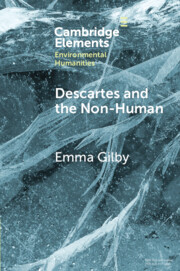Refine search
Actions for selected content:
65 results
Chapter 9 - Descartes in His Pith Helmet
- from Part II - Theoretical Turn
-
-
- Book:
- African Literature in Transition
- Published online:
- 07 November 2025
- Print publication:
- 20 November 2025, pp 171-188
-
- Chapter
- Export citation
Chapter 5 - Suárez on the Origin of Falsity
- from Part II - Being, Its Properties, and Ancillary Notions
-
-
- Book:
- Suárez's <i>Metaphysical Disputations</i>
- Published online:
- 13 October 2025
- Print publication:
- 30 October 2025, pp 87-104
-
- Chapter
- Export citation
Chapter 7 - Suárez on Distinctions
- from Part II - Being, Its Properties, and Ancillary Notions
-
-
- Book:
- Suárez's <i>Metaphysical Disputations</i>
- Published online:
- 13 October 2025
- Print publication:
- 30 October 2025, pp 123-142
-
- Chapter
- Export citation
Chapter 10 - Anthropology and the Deaf and Dumb
- from Part II - Historical and Philosophical Implications
-
-
- Book:
- Kant on Language
- Published online:
- 19 September 2025
- Print publication:
- 09 October 2025, pp 178-196
-
- Chapter
- Export citation
Introduction
-
- Book:
- Vico and the Maker's Knowledge Tradition
- Published online:
- 27 June 2025
- Print publication:
- 17 July 2025, pp 1-24
-
- Chapter
- Export citation
Chapter 2 - Vico and the Making of ‘Praxis Epistemology’
-
- Book:
- Vico and the Maker's Knowledge Tradition
- Published online:
- 27 June 2025
- Print publication:
- 17 July 2025, pp 60-87
-
- Chapter
- Export citation

Descartes and the Non-Human
-
- Published online:
- 02 May 2025
- Print publication:
- 29 May 2025
-
- Element
- Export citation
9 - The Objectifying Gaze of Science and Technology in the Political Context
- from Part III - The Dialectics of Objectification
-
- Book:
- Can Democracy Recover?
- Published online:
- 02 January 2025
- Print publication:
- 16 January 2025, pp 93-99
-
- Chapter
- Export citation
God, Evil, and Anthropomorphism
-
- Journal:
- New Blackfriars / Volume 105 / Issue 6 / November 2024
- Published online by Cambridge University Press:
- 16 October 2024, pp. 582-593
- Print publication:
- November 2024
-
- Article
-
- You have access
- Open access
- HTML
- Export citation
ANSELM’S ONTOLOGICAL ARGUMENT AND GRADES OF BEING
- Part of
-
- Journal:
- The Review of Symbolic Logic / Volume 17 / Issue 3 / September 2024
- Published online by Cambridge University Press:
- 13 September 2024, pp. 635-653
- Print publication:
- September 2024
-
- Article
- Export citation
14 - Entreating the Political
-
-
- Book:
- The Cambridge Companion to Rousseau's <i>Social Contract</i>
- Published online:
- 28 March 2024
- Print publication:
- 22 February 2024, pp 293-320
-
- Chapter
- Export citation
1 - Introduction
-
- Book:
- Naming God
- Published online:
- 30 June 2023
- Print publication:
- 20 July 2023, pp 1-8
-
- Chapter
- Export citation
7 - Augustine, Moses and God as Being Itself
-
- Book:
- Naming God
- Published online:
- 30 June 2023
- Print publication:
- 20 July 2023, pp 138-164
-
- Chapter
- Export citation
Twenty-One - Rights of Nature
- from Part Six - Real Legal Utopias: Interrupting Hegemonic Human Rights
-
- Book:
- Law and the Epistemologies of the South
- Published online:
- 07 August 2023
- Print publication:
- 01 June 2023, pp 622-669
-
- Chapter
- Export citation
Pour une lecture déflationniste du doute cartésien
-
- Journal:
- Dialogue: Canadian Philosophical Review / Revue canadienne de philosophie / Volume 61 / Issue 3 / December 2022
- Published online by Cambridge University Press:
- 06 February 2023, pp. 465-491
-
- Article
-
- You have access
- HTML
- Export citation
III - Thinking
-
- Book:
- Moving Bodies
- Published online:
- 12 January 2023
- Print publication:
- 26 January 2023, pp 54-79
-
- Chapter
- Export citation
7 - Emergence of Modern Science
- from Part I - Psychology’s Historical Foundations
-
- Book:
- History and Systems of Psychology
- Published online:
- 04 November 2022
- Print publication:
- 17 November 2022, pp 127-146
-
- Chapter
- Export citation
2 - Hell
- from Part I - Hell
-
- Book:
- Dante the Theologian
- Published online:
- 02 September 2022
- Print publication:
- 22 September 2022, pp 41-78
-
- Chapter
- Export citation
4 - Human and Nonhuman Animals from Secular and Sacred Perspectives
- from Part I - Concepts
-
-
- Book:
- The Cambridge Companion to Christianity and the Environment
- Published online:
- 21 July 2022
- Print publication:
- 04 August 2022, pp 48-62
-
- Chapter
- Export citation
Chapter 1 - Mechanisms, Then and Now
- from Part I - Ideas of Mechanism
-
- Book:
- Mechanisms in Science
- Published online:
- 09 June 2022
- Print publication:
- 23 June 2022, pp 15-39
-
- Chapter
- Export citation
